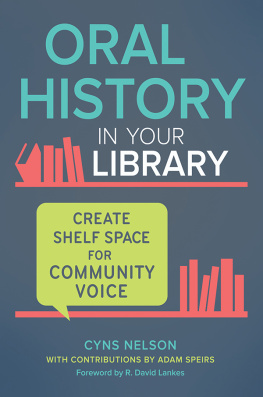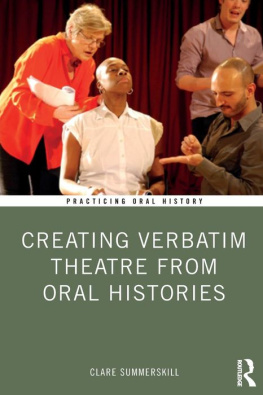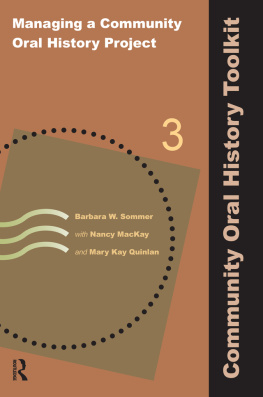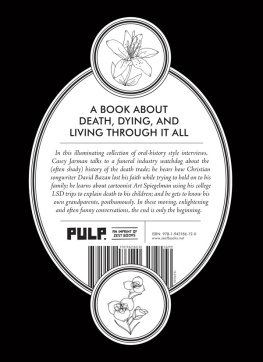ORAL HISTORY IN
YOUR LIBRARY
Create Shelf Space for
Community Voice
Cyns Nelson
with contributions by Adam Speirs
Foreword by R. David Lankes

Copyright 2018 by Cyns Nelson
All rights reserved. No part of this publication may be reproduced, stored in a retrieval system, or transmitted, in any form or by any means, electronic, mechanical, photocopying, recording, or otherwise, except for the inclusion of brief quotations in a review, without prior permission in writing from the publisher.
Library of Congress Cataloging-in-Publication Data
Names: Nelson, Cyns, author. | Speirs, Kristofer Adam, author. | Lankes, R. David, 1970- writer of foreword.
Title: Oral history in your library : create shelf space for community voice / Cyns Nelson ; with contributions by Adam Speirs ; foreword by R. David Lankes.
Description: Santa Barbara, California : Libraries Unlimited, an imprint of ABC-CLIO, LLC, [2018] | Includes bibliographical references and index.
Identifiers: LCCN 2018010718 (print) | LCCN 2018024695 (ebook) | ISBN 9781440857256 (ebook) | ISBN 9781440857249 (paperback: alk. paper)
Subjects: LCSH: LibrariesSpecial collectionsOral history. | LibrariesSpecial collectionsHistory, Local. | Oral history. | Libraries and community.
Classification: LCC Z688.O52 (ebook) | LCC Z688.O52 N45 2018 (print) | DDC 025.2/79dc23
LC record available at https://lccn.loc.gov/2018010718
ISBN: 9781440857249 (paperback)
9781440857256 (ebook)
22 21 20 19 181 2 3 4 5
This book is also available as an eBook.
Libraries Unlimited
An Imprint of ABC-CLIO, LLC
ABC-CLIO, LLC
130 Cremona Drive, P.O. Box 1911
Santa Barbara, California 93116-1911
www.abc-clio.com
This book is printed on acid-free paper 
Manufactured in the United States of America
Illustrations created for this title by Bobby Small, Doodler. Used with permission.
Contents
by R. David Lankes
Foreword
I was presenting at a pop-up library in Tilburg. The town in the Netherlands was an historic center for building and maintaining trains. In recent times, the train industry had moved overseas. The town was in the process of reclaiming warehouses and huge open workshops once used to build and repair engines and railcars. The new space was opened up to entrepreneurs and start-ups. One of the massive open floors would house the new library. The pop-up library was an experimental space for librarians and the community to come together and play with new configurations and services for the library once it moved.
This is not an unusual story. Across the world, spaces meant for large industries are being converted into spaces for a new economy. What was different was that the library set up a large interactive kiosk in the middle of the experimental space. Community members could use the kiosk to learn about the train industry and the history of the space. Once again, not particularly innovative. That is until I found out that the kiosk was the result of an oral history project. The kiosk was accessing the memories, the memorabilia, and the stories of train workers.
You could click on a floor plan, a picture, or an artifact and hear the reality of these things through the world of those who built the space and those who worked in it. Visiting workers were invited to add their own memories and stories. For me, it was an amazing example of seeing a community as a true collection of a library. It was the power of oral history.
In the book in your hands, Cyns Nelson shows in the most wonderful way the reality that knowledge is uniquely human and created through conversations (including with ourselves). If libraries are in the knowledge business, they are in the conversation business. They are in the creation business. They are in the business of helping people make meaning in their lives. The oral history methods detailed in these pages make these sentiments practical and present.
Our communities are brilliant. The experiences of plumbers and doctors, of layers and stay-at-home parents, professors and writers and illustrators and teachers and barbers and clerks and children form the rich tapestry woven together by the interactions of communities. Using oral history techniques, this community fabric can be instrumental in advancing the aspirations of the community.
This book, these techniques, the very idea of using oral histories within a community are more than nice pieces of outreach. They are a real statement that the stories of a communitythe results of members making meaning of their livesare valuable, and therefore, so are the communities themselves. Too often librarians and the libraries they build and maintain focus on the problems and deficits of people. A library seeks to improve literacy, to help the unemployed, or to enrich the lives of children. In other words, librarians feel the community is illiterate, unemployed, and isolated. An oral history project says, your lives and your stories are the most valuable asset we have as a community, and as a library, we are going to help share that with the world.
I know you will find Cyns Nelsons work here approachable and pragmatic. What I hope you also see is that she is providing a blueprint for centering the librarian in the community, and the community in the library. Dont be fooled by the prose and reassurance in the bookwhile she is talking about oral histories from her vast experience, she is also inviting you to think differently about your community and your library. I love it.
R. David Lankes
Preface
In 2005, as an adult student of library science, I attended a daylong conference of the Society of Rocky Mountain Archivists. I was there because one of the members had offered to pay the registration cost, and at the time, my interests were broad and unsettledso I jumped at the offer. For that particular meeting, a theme was oral historysomething Id never considered. Many of the participants described challenges or outright barriers faced when dealing with oral history as a material. A good portion of the obstructions, by my observation, were mental hurdles, owing to the unusualness of interviews compared to more static documents associated with archival collections.
Then came Wendy Hall, branch manager from Boulders Carnegie Library for Local History, home to the Maria Rogers Oral History Program (MROHP). Boulder pursued interviews and had established a thriving program that normalized the treatment of oral history. By the date of the conference, close to 1,500 interviews had been digitized (or were born digital) and were being placed online for listening. This accomplishment seemed exceptional, and my imagination was captivated. I was drawn, first, to the idea of recorded interviews as a primary information source. And then, seeing that a public library could instigate the creation, collection, and dissemination of oral histories well, brilliant! (I thought.)
Two years later, I became a volunteer intern, learning about the Maria Rogers program and their process for integrating oral histories into the librarys collection and mission. Also, I learned how extraordinary was the prototypein terms of setting, approach, scale, and product. A rare model. And when the position for oral history coordinator opened, again I jumped.
Flash forward to May 2016 and the Public Library Associations annual meeting at the Convention Center in Denver, Colorado. I never had participated in events of the PLAwhile I had presented to the American Library Association and regularly attended meetings of the Oral History Association, Society of American Archivists, and regional library/archives gatherings. Adam Speirs asked if I would join a panel that focused on oral history in public-library settings, and without hesitation I agreed. I was eager to share a picture of our work at the Carnegie Library and our function in the Boulder Public Library system. I knew that my jobentirely dedicated to oral historywas unique if not singular in a public-library setting. Our panel had a large audience and ran out of time to respond to all of the questions and comments. Success!











